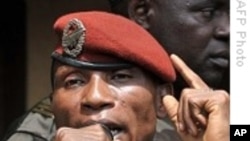Human rights groups in Guinea want members of the military brought before the International Criminal Court for crimes against humanity in last week's killing of at least 157 opposition demonstrators. The military government's political opponents are refusing to join an internal inquiry into that violence.
Political parties, civil society groups, and trade unions in Guinea are refusing the military government's offer of an independent inquiry into last Monday's violence because they say the ruling military council must be dissolved before the country can move forward.
Human rights groups say soldiers committed crimes against humanity during that violence that should be brought before the International Criminal Court.
Tierno Madjou Sow is president of Guinea's Human Rights Organization.
Sow says members of Guinea's military raped women in public, a crime against humanity that can be brought before the International Criminal Court. He says they hit and tortured protesters in an abominable fashion, appearing happy to be beating political leaders.
Demonstrators were protesting the expected candidacy of military ruler Captain Moussa Dadis Camara.
Sow says at least 157 people were killed in that violence, but the death toll could be higher as he says the military used eight trucks to collect bodies that have not been seen since.
A reporter who was at the stadium and agreed to be interviewed only if his name was not used says soldiers attacked protesters with what he describes as a barbaric ferocity.
When he identified himself as a journalist to members of the presidential guard wearing red berets, he says they beat him with their fists and hit him over the head with clubs. He says policemen kicked him and punched him in the face. Then another red beret whipped him with a belt.
One witness says he saw red berets of the president guard violating women inside the stadium. He says there were two soldiers who stripped about 15 girls naked and violated them as well. After that, he says the soldiers clashed with members of the gendarmerie who ordered them to stop.
A third man says he saw things that day that he has never seen before and does not know how he escaped without injury.
Once the stadium was full, he says security forces closed all the doors and shot directly into the crowd not into the air. He says he saw many people fall. When those who survived tried to flee the stadium, he says members of the presidential guard were waiting for them at the gates and whipped them with wire. Those who fell were trampled by others trying to escape.
Under Guinean law, human rights groups may not sue the government. Sow says two separate groups are being established to bring charges against the military: one group for women who were raped, another for the other victims of that violence.
Sow says his human rights group is conducting a census of each family in Conakry to find out who was killed and who disappeared. He says they also hope to publish the names of people who are still in detention so their families will know they are alive.
Captain Camara says he is not responsible for the events of September 28 because he was not at the stadium. He is blaming his political opponents for staging an illegal protest, saying they should have known Guinea's military contains what he calls "uncontrollable elements."
Asked about Captain Camara's role in the violence, French Foreign Minister Bernard Kouchner told a parliamentary foreign affairs committee that, at the least, Paris "strongly suspects" Captain Camara to have "taken part in the decision."
Captain Camara has dismissed French accusations, saying Guinea is not a district of France. But he has not entirely ignored mounting international criticism. He says the proposed independent inquiry is in response to that pressure and he is now offering to form a transitional government.
Frederic Kolie is Captain Camara's minister for territorial administration and political affairs.
Kolie says Captain Camara wants Guineans inside and outside the country to take part in the ongoing democratization process. He says the military is working toward an inclusive democracy that includes Guineans living abroad. He says the ruling council is committed to meeting voter registration deadlines ahead of presidential balloting in January.
Captain Camara has not yet formally announced his candidacy but has told supporters that he will not insult them by ignoring their demands that he run.
The African Union says it will sanction him later this month unless he makes clear that he is not running for president.




